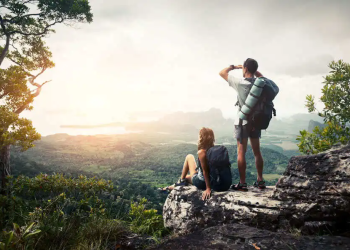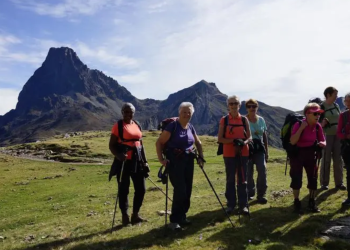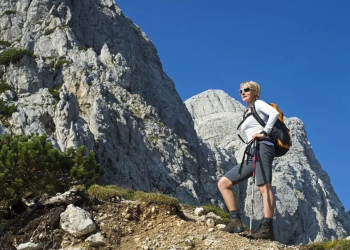Traveling offers exciting opportunities for exploration and adventure, but it’s essential to prioritize health and wellness to fully enjoy your journey. In this comprehensive guide, we’ll explore practical tips and strategies for maintaining your well-being while on the go.
Healthy Eating Habits on the Road
Eating nutritious meals and snacks is essential for sustaining energy and vitality during travel. Opt for balanced meals with plenty of fruits, vegetables, lean proteins, and whole grains. When dining out, look for restaurants that offer healthy options or consider packing your own healthy snacks to avoid unhealthy temptations.
Staying Hydrated While Traveling
Proper hydration is crucial for overall health and well-being, especially when traveling. Carry a reusable water bottle and aim to drink plenty of water throughout the day. Be mindful of staying hydrated, especially in hot or dry climates, and limit consumption of sugary beverages that can lead to dehydration.
Exercise and Physical Activity While Traveling
Staying active during travel is key to maintaining physical fitness and mental clarity. Incorporate exercise into your travel itinerary by exploring the local surroundings on foot, renting bikes, or participating in outdoor activities such as hiking or swimming. Even short bursts of activity can have significant benefits for your health.
Managing Stress and Mental Well-Being
Traveling can sometimes be stressful, so it’s essential to prioritize stress management techniques to maintain mental well-being. Practice relaxation techniques such as deep breathing, meditation, or yoga to alleviate stress and promote a sense of calm. Take breaks when needed and listen to your body’s signals to avoid burnout.
Sleep Quality and Jet Lag Management
Quality sleep is essential for overall health and well-being, but traveling can disrupt sleep patterns and lead to jet lag. Establish a consistent sleep schedule, even while traveling, and create a comfortable sleep environment by packing earplugs, an eye mask, and any other sleep aids you may need. Gradually adjust to new time zones by exposing yourself to natural light and staying hydrated.
Maintaining Personal Hygiene and Sanitation
Practicing good personal hygiene is crucial for preventing illness and maintaining well-being while traveling. Wash your hands frequently with soap and water, especially before eating or touching your face. Carry hand sanitizer for times when soap and water are not available, and prioritize cleanliness in shared spaces such as public restrooms and transportation hubs.
Protecting Your Skin and Sun Safety
Exposure to the sun’s harmful UV rays can lead to sunburn, premature aging, and skin cancer. Protect your skin by wearing sunscreen with a high SPF, seeking shade during peak sun hours, and wearing protective clothing such as hats and sunglasses. Reapply sunscreen regularly, especially after swimming or sweating, and stay hydrated to maintain skin health.
Managing Medications and Health Conditions
If you take medications or have underlying health conditions, it’s essential to manage them effectively while traveling. Pack an ample supply of medications in your carry-on luggage, along with any necessary medical supplies or equipment. Research local pharmacies and healthcare facilities at your destination, and carry a copy of your medical records and prescriptions in case of emergencies.
Balancing Work and Travel Responsibilities
Maintaining work-life balance while traveling can be challenging, but it’s essential for overall well-being. Set realistic expectations for your workload and prioritize self-care activities such as exercise, relaxation, and leisure time. Communicate openly with colleagues or clients about your availability and establish boundaries to prevent burnout.
Cultural Considerations for Health and Wellness
When traveling to new destinations, be mindful of cultural differences in health practices and beliefs. Respect local customs and traditions while prioritizing your own health and well-being. Be open to trying new foods and experiences, but also listen to your body’s needs and boundaries.
Emergency Preparedness and Travel Insurance
Unexpected emergencies can arise during travel, so it’s crucial to be prepared for any situation. Purchase travel insurance that includes coverage for medical emergencies, trip cancellations, and other unforeseen events. Familiarize yourself with emergency protocols and contact information for local healthcare providers and emergency services at your destination.
Incorporating Mindfulness and Self-Care Practices
Practicing mindfulness and self-care is essential for managing stress and promoting overall well-being while traveling. Take time each day to engage in activities that bring you joy and relaxation, such as reading, journaling, or enjoying nature. Prioritize self-care practices that nourish your mind, body, and spirit.
Staying Connected with Loved Ones
Maintaining connections with family and friends back home can provide support and comfort during travel. Stay in touch through phone calls, video chats, or social media updates to share your experiences and stay connected with loved ones. Reach out for support when needed, and lean on your support network for encouragement and reassurance.
Conclusion
Prioritizing health and wellness while traveling is essential for enjoying a safe, fulfilling, and enriching journey. By incorporating these practical tips and strategies into your travel routine, you can maintain your well-being on the go and make the most of your travel experiences.

FAQs After The Conclusion
- How can I maintain a healthy diet while traveling, especially in countries with different cuisines?Focus on choosing balanced meals with plenty of fruits, vegetables, lean proteins, and whole grains. Be adventurous with trying new foods, but also seek out familiar options when needed. Consider packing healthy snacks to have on hand when healthy options are limited.
- What should I do if I experience jet lag and have trouble adjusting to a new time zone?Ease into a new time zone by gradually adjusting your sleep schedule before your trip. Expose yourself to natural light during daylight hours and avoid caffeine and alcohol, which can disrupt sleep patterns. Consider using melatonin supplements or other sleep aids to help regulate your sleep-wake cycle.
- How can I prioritize exercise and physical activity while traveling, especially when I have a busy itinerary?Look for opportunities to incorporate physical activity into your daily routine, such as walking or biking to explore new destinations. Choose activities that you enjoy and that fit into your schedule, whether it’s a morning yoga session or an evening stroll.
- What should I do if I become ill or injured while traveling abroad?Seek medical attention from a local healthcare provider or emergency services if you become ill or injured while traveling abroad. Contact your travel insurance provider for assistance with finding medical care and navigating the healthcare system in your destination country.
- How can I manage stress and maintain mental well-being while traveling, especially during busy or challenging times?Practice relaxation techniques such as deep breathing, meditation, or mindfulness to manage stress and promote mental well-being. Take breaks when needed and prioritize activities that bring you joy and relaxation.
- What should I do if I experience homesickness or loneliness while traveling solo?Stay connected with loved ones back home through phone calls, video chats, or social media updates. Engage in activities that bring you comfort and joy, such as exploring new destinations, trying new foods, or meeting new people.
- Is it safe to drink tap water in other countries, or should I stick to bottled water?It’s essential to research the safety of tap water in your destination country before drinking it. In some countries, tap water may be safe to drink, while in others, it may be advisable to stick to bottled water or use water purification methods.
- What should I do if I feel overwhelmed or anxious while traveling, especially in unfamiliar or challenging situations?Reach out for support from trusted friends, family members, or travel companions if you feel overwhelmed or anxious while traveling. Take time to rest and recharge, and consider seeking professional help if needed. Remember to prioritize your well-being and listen to your body’s needs.








